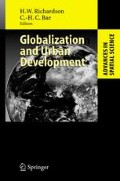Abstract
Globalization has two elements: economic globalization refers to the integration of global markets, while ideological globalization refers to the political ideas that underlie the spread of markets, trade, and democracy. Economic globalization is limited in its reach in the developing world: some cities have done well; some, despite not being globalized, have regional importance; and large regions and numerous cities have been bypassed. Ideological globalization, on the other hand, is far more widespread from an intellectual and a policy perspective. The tenets of ideological globalization are likely to work further to the relative detriment of the cities/regions in the global periphery. This is a “cumulative causation” argument that raises questions about the development prospects of peripheral regions.
Access this chapter
Tax calculation will be finalised at checkout
Purchases are for personal use only
Preview
Unable to display preview. Download preview PDF.
References
Ahuja V, Bidani B, Ferreira F, Walton M (1997) Everyone’s miracle? Revisiting poverty and inequality in East Asia. World Bank, Washington DC
Akita T, Lukman RA (1995) Interregional inequalities in Indonesia: A sectoral decomposition analysis for 1975–92. Bulletin of Indonesian Economic Studies 31:61–81
Alesina A, Rodrik D (1994) Distributive politics and economic growth. Quarterly Journal of Economics 108:465–90
Aswicahyono HH, Bird K, Hill H (1996) What happens to industrial structure when countries liberalize? Indonesia since the mid-1980’s. The Journal of Development Studies 32:340–63
Baran P (1957) The Political Economy of Growth. Monthly Review Press, New York
Barber B (1995) Jihad vs. McWorld: How Globalism and Tribalism are Reshaping the World. Ballantine Books, New York
Behrman J, Rondinelli D (1992) The cultural imperatives of globalization: urban economic growth in the twenty-first century. Economic Development Quarterly 6:115–26
Cardenas M, Ponton A (1995) Growth and convergence in Colombia: 1950–1990. Journal of Development Economics 47:5–37
Chakravorty S (2000) How does structural reform affect regional development: Resolving contradictory theory with evidence from India. Economic Geography 76:367–394
Chossudovsky M (1997) The Globalization of poverty: Impacts of IMF and World Bank reforms. Third World Network, Penang, Malaysia
Daniere A (1996) Growth, inequality and poverty in South-east Asia: The case of Thailand. Third World Planning Review 18:373–396
Fan CC (1995) Of belts and ladders: State policy and uneven regional development in post-Mao China. Annals of the Association of American Geographers 85:421–449
Fedorov L (2002) Regional inequality and regional polarization in Russia, 1990–99. World Development 30:443–456
Frank AG (1967) Capitalism and underdevelopment in Latin America. Monthly Review Press, New York
Friedmann TL (1999) The lexus and the olive tree: Understanding globalization. Farrar, Strauss and Giroux, New York
Ghosh B, Marjit S, Neogi C (1998) Economic growth and regional divergence in India: 1960 to 1995. Economic and Political Weekly 33:1623–1630
Gustafsson B, Shi L (2002) Income inequality within and across counties in rural China 1988 and 1995. Journal of Development Economics 69:179–204
Grant R, Short JR (eds) (2002) Globalization and the margins. Palgrave Macmillan, Basingstoke, UK, and New York
Hall T, Hubbard P (1998) The entrepreneurial city. Wiley, Chichester
Hirschman AO (1958) The strategy of economic development. Yale University Press, New Haven
Hirschman AO (1973) The changing tolerance for income inequality in the course of economic development. Quarterly Journal of Economics 87:544–565
Kanbur R, Zhang X (2003) Fifty years of regional inequality in China: A journey through central planning, reform and openness. Paper presented at UNU WIDER Conference on Spatial inequality in Asia, March 2003. Paper downloaded on April 5, 2003 from http://www.wider.unu.edu/conference/conference-2003-1/conference2003-1.htm
Kaplinsky R (2001) Globalisation and unequalisation: What can be learned from value chain analysis. Journal of Development Studies 37:117–146
Kohl B (2002) Stabilizing neoliberalism in Bolivia: Popular participation and privatization. Political Geography 21:449–472
Milanovic B (2002) True world income distribution, 1988 and 1993: First calculation based on household surveys alone. Economic Journal 112:51–92
Myrdal G (1957) Economic theory and underdeveloped regions. Duckworth, London
Ohmae K (1995) The end of the nation state: The rise of regional economies. The Free Press, New York
Pritchett L (1997) Divergence. Big time. Journal of Economic Perspectives 11:3–17
Robertson R (1992) Globalisation. Sage, London
Robertson R (2002) Opposition and resistance to globalization. In: Grant R, Short JR (eds) Globalization and the margins. Palgrave Macmillan, Basingstoke, UK and New York
Rohlen TP (2002) Cosmopolitan cities and nation states: Open economics, urban dynamics, and government in East Asia. Asia/Pacific Research Center, Stanford, Mimeo
Sala-i-Martín X (1996) Regional cohesion: Evidence and theories of regional growth and convergence. European Economic Review 40:1325–1352
Sen A (2002) Globalization, inequality, and global protest. Development 45:11–16
Sjoholm F (2000) Economic recovery in Indonesia: The challenge of combining FDI and regional development. Paper presented at the IRSA International Conference, Jakarta, Mimeo
Williamson J (1990) Latin American adjustment: How much has happened? Institute of International Economics, Washington DC
Williamson J (2000) What should the World Bank think about the Washington Consensus? World Bank Research Observer 15:251–264
Williamson JG (1997) Globalization and inequality, past and present. World Bank Research Observer 12:117–135
World Bank (2000) Cities in transition: World Bank urban and local government strategy. The World Bank, Washington DC
World Bank (2001) World development indicators 2001. The World Bank, Washington DC
Author information
Authors and Affiliations
Editor information
Editors and Affiliations
Rights and permissions
Copyright information
© 2005 Springer-Verlag Berlin Heidelberg
About this chapter
Cite this chapter
Chakravorty, S. (2005). Urban development in the global periphery: The consequences of economic and ideological globalization. In: Richardson, H.W., Bae, CH.C. (eds) Globalization and Urban Development. Advances in Spatial Science. Springer, Berlin, Heidelberg. https://doi.org/10.1007/3-540-28351-X_3
Download citation
DOI: https://doi.org/10.1007/3-540-28351-X_3
Publisher Name: Springer, Berlin, Heidelberg
Print ISBN: 978-3-540-22362-7
Online ISBN: 978-3-540-28351-5
eBook Packages: Business and EconomicsEconomics and Finance (R0)

